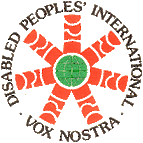Disabled Peoples' International - Europe
Understanding Biomedicine
Listening disabled people
The possibilities, risks, consequences, desirability and legitimating of biomedicine are widely discussed in science and in public.
The debate however has suffered because the perspective of people living with impairment is partly ignored or not taken seriously. Despite the fact that medical-technical developments in many fields improved the life of people with a disability they are rarely included as partners in designing research projects.
There may be different reasons for it. One may be that disabled people may not have the information or the knowledge; others may be that researchers have not the same priorities as disabled people on research issues. There may be other factors that we will try to identify during this seminar.
The aim of the session is to inform members of civil society organisations working on disability issues about planned developments in medicine that might be relevant for them so they play in the future a more active role in decision making.
The Workshop is part of a project in the frame of the 6th EU-framework, Specific programme “Structuring the ERA, Work Programme Science and Society” (FP6-2005-Science-and-Society-19-044597). The main purpose of STACS (Science technologies and civil society -Civil Society Organisations, actors in the European system of research and innovation) is to provide opportunities for scientists and civil society organisation to design and do common research projects.
The conference will be in English and French and bilingual participants will make the conference understandable for all participants.
Programme
9.30 Registration
10h00 Welcoming
·
Mayor of Paris or a representing person
·
Dr. Katrin Grüber, IMEW, Berlin
·
Jean-Luc Simon, DPI Europe Chair, Paris
·
Dr. Claudia Neubauer, Fondation Sciences Citoyennes, Paris
Defining research prioritie
·
10h 30Prof. John Burn, University of Newcastle, UK, New developments in biomedicine.
·
11h 30Dr Tom Shakespeare PEALS, Newcastle, UK, From a disability studies perspective
·
12h 30Prof. Bernard BUSSEL, Hôpital Raymond Poincaré, Paris, Offers from technology –Development of New Therapies regarding CNS trauma
13h 30 Lunch
15h 00 Parallel sessions
Listening to disabled people
·
Dr. Patrick Pellerinl'APF, membre du Conseil d'Orientation de l'Agence de la Biomédecine"
·
Javier Romañach Cabrero Independent Living Forum, Spain
·
Moderation: Dr. Claudia Neubauer
Understandingscience
·
Dr. Alain Simon, APHP, Paris (to be confirmed)
·
Dr. Tom Shakespeare, PEALS, United Kingdom
·
Moderation Paola Maiello, Lawyer and Chairperson of the Spina Bifida Association, Italia
16h30 Coffee break
17h00 Conclusions of the sessions
17h15Participation of disabled people in the definition of the priorities of medical research
·
Prof. John Burn, University of Newcastle
·
Javier Romañach Cabrero Independent Living Forum, Spain
·
Moderation: Katrin Grüber
·
17h45 Debate and conclusion of the workshop
18h30 End of the Workshop
The IMEW
The principal task of the institute is interdisciplinary and independent research in the field of medical ethics. The institute concerns itself in particular with the problems of the disabled and chronically ill people as seen from their own standpoint as well as the impact of bioscience on society as a whole.
The institute was established in Germany in 2001 and is a non-profit public company with limited liability. The circle of nine partners consists from nine disability and selfhelp-organisations. The institute is funded in the main by the German Foundation Deutsche Behindertenhilfe - Aktion Mensch.
The institute is member of theEuropean Association of Centres of Medical Ethics(EACME) and the German-speakingNetwork TA.
